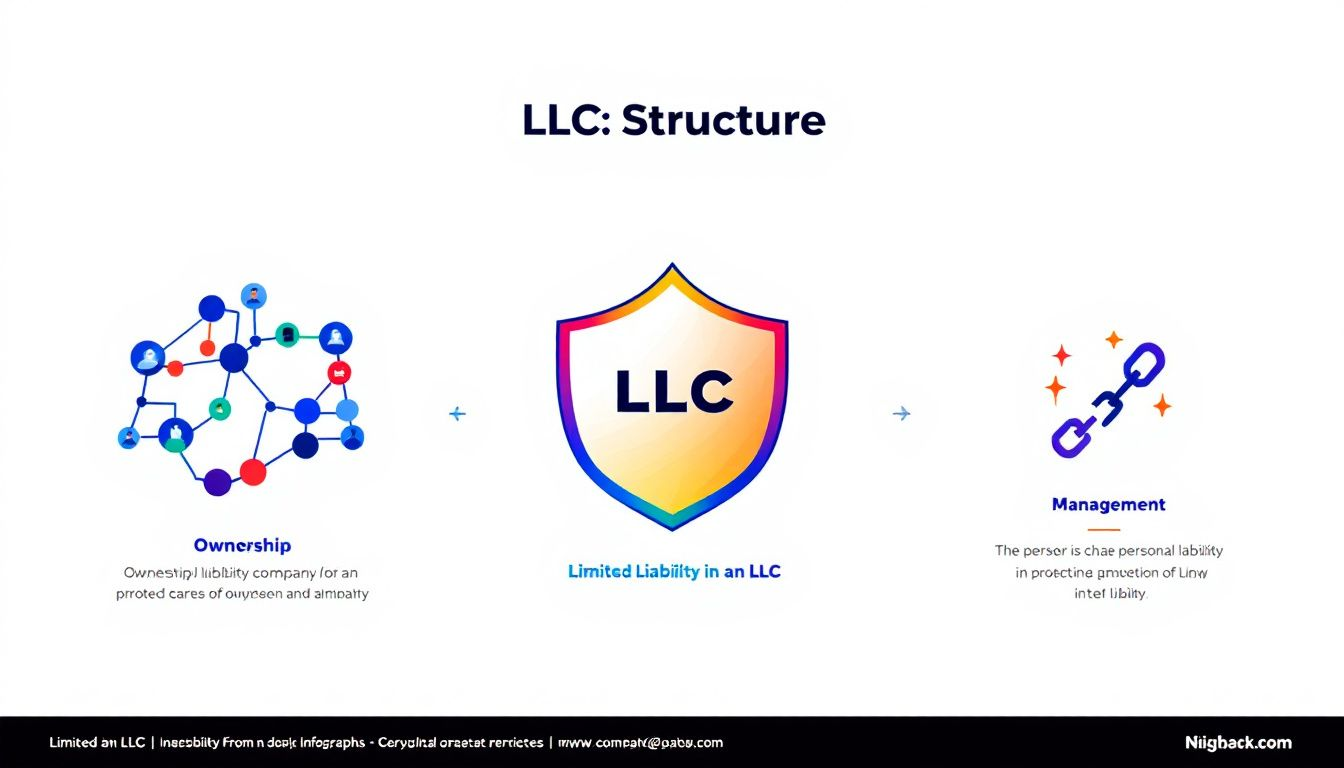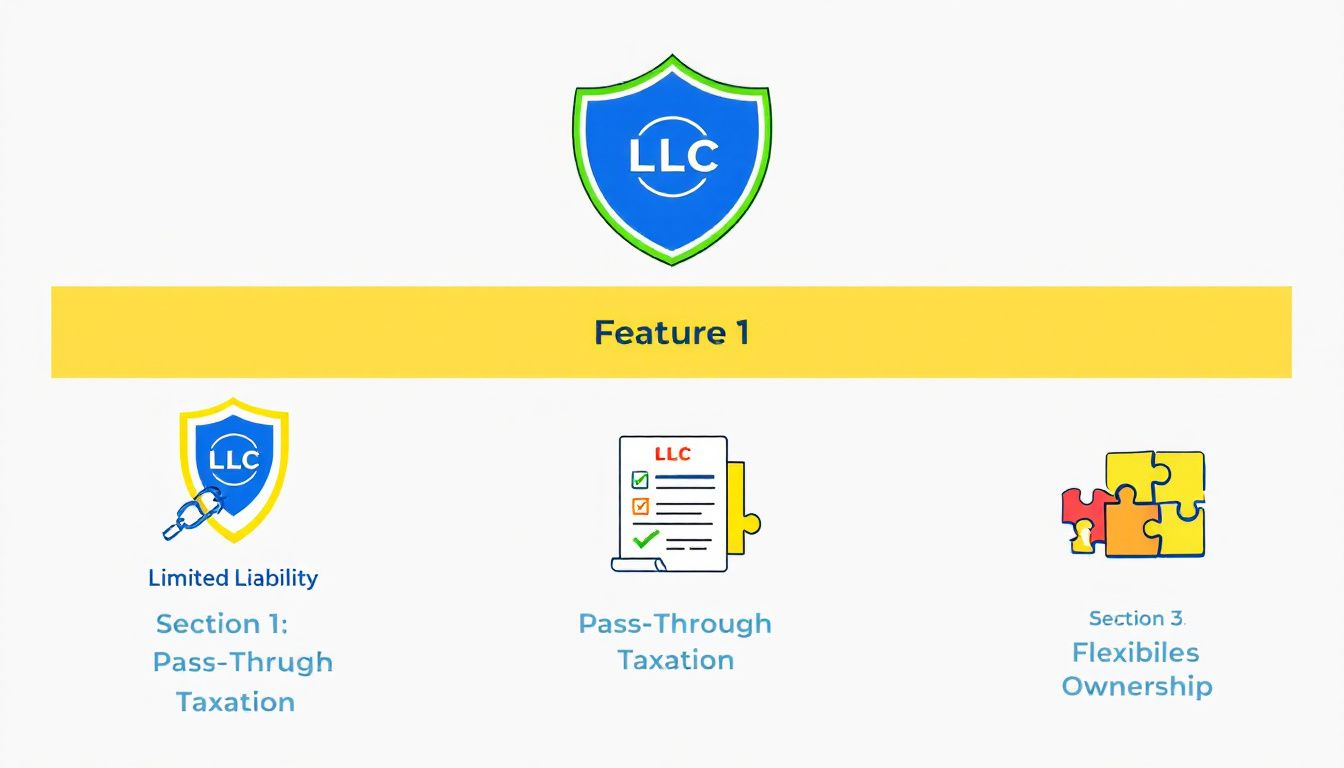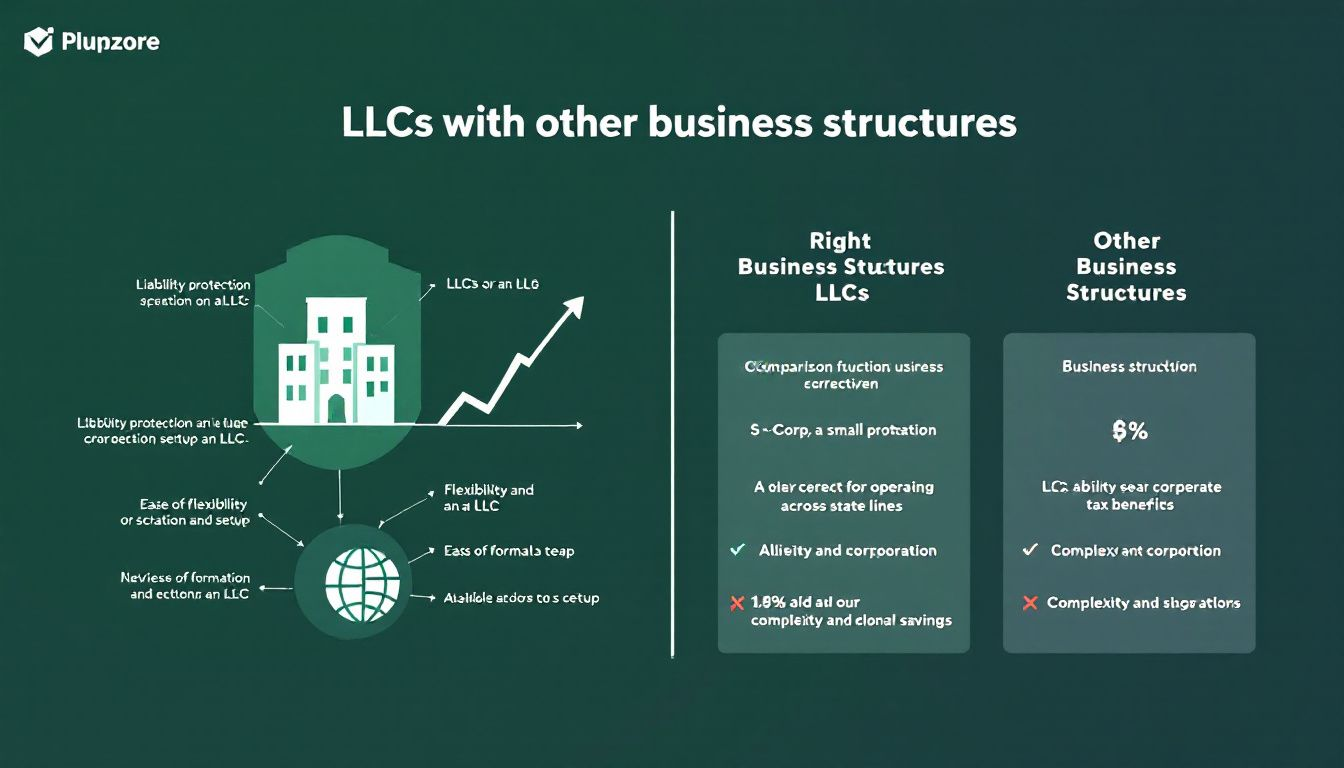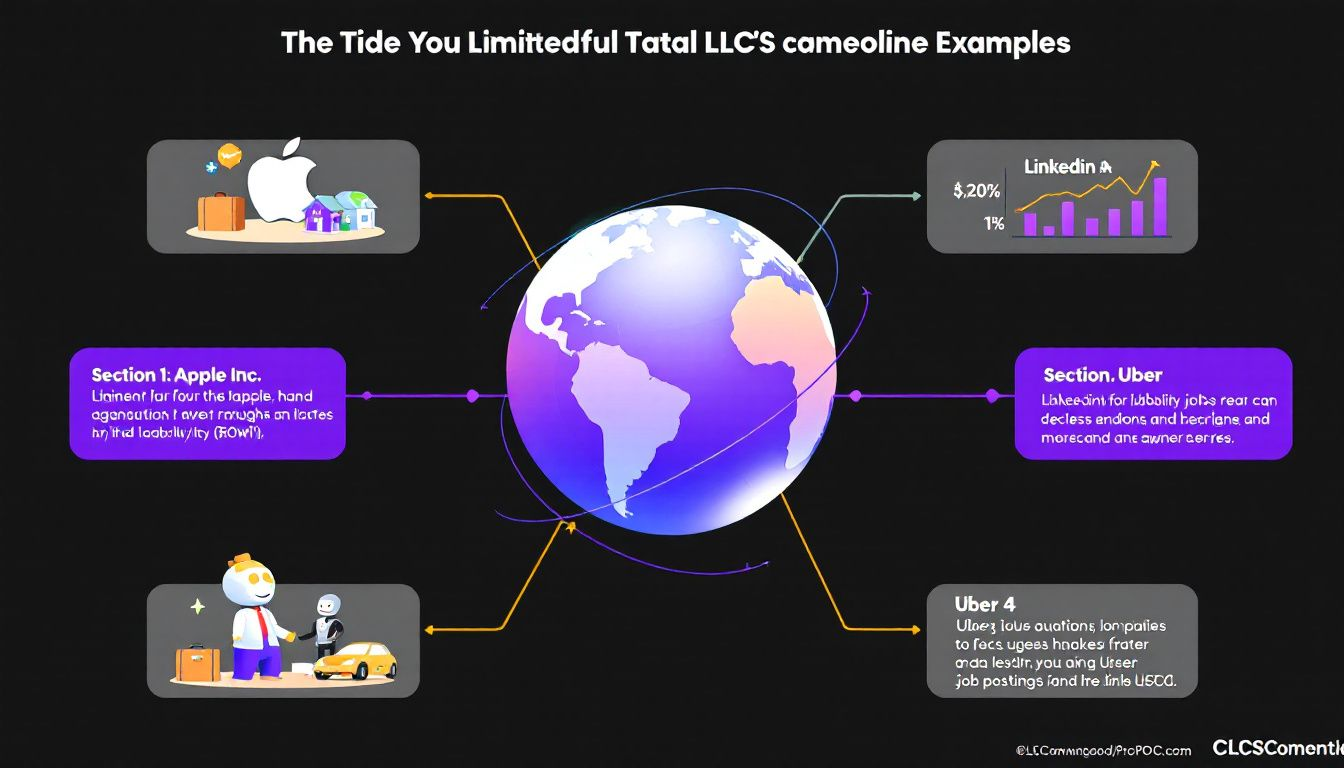Understanding an LLC Limited Liability Company: Benefits and Setup Guide
An LLC, or limited liability company, protects your personal assets from business debts while offering flexibility in management and taxation. This guide will cover the benefits of an LLC limited liability company, formation steps, and help you decide if an LLC is right for you.
Key Takeaways
- An LLC provides limited liability protection, safeguarding members’ personal assets from business debts, while also allowing operational flexibility and pass-through taxation.
- Forming an LLC involves strategic steps such as choosing a state, selecting a business name, designating a registered agent, and creating an operating agreement to govern the business.
- Despite its advantages, an LLC may involve higher self-employment taxes and complexities in formation compared to simpler business structures like sole proprietorships.
Understanding an LLC Limited Liability Company: Benefits and Setup Guide

A Limited Liability Company (LLC) merges the advantages of corporations and partnerships, providing a flexible and protective business structure. This blend makes LLCs appealing to both startups and established enterprises. The primary allure of an LLC lies in its ability to offer limited liability protection to its members, shielding their personal assets from business debts and liabilities.
LLCs are incredibly adaptable, allowing members to manage the business directly or appoint managers to handle operations. This flexibility extends to taxation, where LLCs benefit from pass-through taxation, enabling profits to be taxed at the members’ personal income tax rates. Combining the top features of partnerships and corporations, LLCs offer a compelling structure for entrepreneurs seeking protection and versatility.
Introduction
A Limited Liability Company (LLC) stands as a beacon of modern business structures, offering a harmonious blend of the benefits of corporations and partnerships. The main advantage of an LLC is limited liability protection, shielding individual owners from personal responsibility for business debts. This protection is a cornerstone for many entrepreneurs, safeguarding their personal assets in the face of business risks. Limited liability companies provide a flexible option for those looking to balance risk and reward.
The appeal of LLCs extends beyond liability protection. With the rise of varied business entities, the flexibility and simplicity offered by LLCs make them a popular choice for small businesses and startups. Understanding the intricacies of LLCs helps business owners make informed decisions that align with their strategic goals, fostering growth and security.
What is a Limited Liability Company (LLC)?
A Limited Liability Company (LLC) is a hybrid business structure that combines elements of both corporations and partnerships. This unique configuration allows LLCs to offer the flexibility and tax benefits typically associated with partnerships while providing the liability protection characteristic of corporations. An LLC operates as a separate legal business entity, capable of entering contracts, owning assets, and conducting business independently of its owners.
One of the most attractive features of LLCs is their flexibility. They can be managed by their members or by appointed managers, allowing for tailored operational control. Additionally, LLCs offer pass-through taxation, meaning that profits and losses are reported on the members’ personal tax returns, thus avoiding the double taxation commonly faced by corporations.
This combination of flexibility and protection makes LLCs a preferred choice for many entrepreneurs.
Key Features of an LLC

One of the most significant features of an LLC is the limited liability protection it offers to its members. This means that members are not personally liable for the company’s debts and obligations beyond their investment in the LLC. The LLC is treated as a separate legal entity, allowing it to own property, enter contracts, and conduct business independently of its owners.
LLCs also provide considerable flexibility in their management structure. They can be either member-managed or manager-managed, giving the owners the freedom to choose the operational setup that best suits their needs. Furthermore, an LLC generally has perpetual existence, meaning it can continue operating regardless of changes in ownership. This feature, along with the ability to transfer financial interests, makes LLCs a robust and adaptable business structure.
Advantages of Forming an LLC

Forming an LLC offers numerous advantages that make it a compelling choice for business owners. One of the primary benefits is limited liability protection, ensuring that the members’ personal assets are safeguarded against the company’s debts and obligations. This protection is crucial in mitigating personal financial risk.
Another significant advantage is the tax benefits associated with LLCs. LLCs benefit from pass-through taxation, where profits are taxed at the owners’ personal tax rates, avoiding the double taxation that corporations face.
Additionally, LLCs offer operational flexibility, allowing for multiple classes of membership interests and the ability to allocate income in various ways. This flexibility, coupled with the simplicity of formation, makes LLCs an attractive option for many entrepreneurs.
Disadvantages of an LLC
While LLCs offer many advantages, they also come with certain disadvantages that potential owners should consider. One notable drawback is the higher tax liabilities that LLC members may incur due to self-employment taxes applied to their entire net earnings. This can result in a higher overall tax burden compared to other business structures.
Additionally, forming an LLC can be more complex and costly than establishing other business structures, such as sole proprietorships. LLCs require compliance with state-specific laws and regulations, which can entail significant administrative work and costs.
Furthermore, LLCs may face limitations in raising capital compared to corporations, making it more challenging to attract investors or secure venture capital.
Steps to Form an LLC
Forming an LLC involves several crucial steps, each of which must be carefully executed to ensure compliance and successful establishment. The process begins with choosing the state in which to form the LLC, as state regulations can significantly impact compliance and operations.
Next, selecting a suitable business name is essential, followed by filing the necessary documents, such as articles of organization with the state. Designating a registered agent is another important step, as this person or entity will receive legal notices and tax documents on behalf of the LLC.
Finally, after the LLC is formed, obtaining an Employer Identification Number (EIN) at the federal level is necessary for tax purposes. These steps collectively ensure that the LLC is legally recognized and compliant with state and federal requirements.
Choose a State for LLC Formation
Choosing the correct state for forming an LLC is a strategic decision that can impact the business’s compliance and operational efficiency. State regulations for LLCs vary widely, affecting how these entities are formed and operated. Therefore, it is essential to understand the specific laws, fees, and requirements of each state to make an informed decision.
LLCs have the advantage of being able to be formed in any state regardless of where the business will operate. This allows business owners to choose a state with favorable laws and regulations, potentially reducing administrative burdens and costs. However, it is crucial to thoroughly research each state’s requirements to ensure the chosen state aligns with the business’s strategic goals.
Select a Business Name
Selecting an appropriate business name is a critical step in forming an LLC. It is essential to check the state’s naming requirements and ensure the name is available. Conducting a trademark search is also advisable to avoid potential intellectual property infringements.
If you are not ready to file the formation documents immediately, you can reserve the desired business name for a small fee, ensuring it is available when you are ready to proceed.
Keep in mind that certain words, such as those suggesting banking or insurance, are typically prohibited in LLC names. Careful consideration of these factors will help in selecting a suitable and compliant business name.
Designate a Registered Agent
Designating a registered agent is a mandatory step in forming an LLC. The registered agent is responsible for receiving legal documents, notices, and tax documents on behalf of the LLC. This ensures that the LLC is properly notified of any legal actions or requirements.
The registered agent must have a physical address in the state where the LLC is formed, as PO Boxes are not acceptable. This requirement ensures that the LLC can be reliably contacted and that important documents are received in a timely manner.
Choosing a reliable registered agent is crucial for maintaining compliance and protecting the LLC’s legal interests.
Creating an LLC Operating Agreement
An LLC operating agreement is a legally binding document that outlines the management structure and operational procedures of the LLC. It is essential for defining the roles and responsibilities of the members and establishing clear guidelines for the operation of the business.
The operating agreement addresses crucial elements such as ownership percentages, profit and loss distribution, and procedures for adding new members or transferring ownership interests. A well-drafted operating agreement helps LLC members avoid disputes and maintain smooth operations.
It also protects members from personal liability for the LLC’s debts and obligations.
LLC Taxation Overview
LLC taxation is one of the most flexible aspects of this business structure. LLCs can opt for pass-through taxation, where profits and losses are reported on the members’ personal tax returns, avoiding the double taxation faced by corporations. Alternatively, LLCs can choose to be taxed as a corporation, providing further versatility in financial management.
Choosing the tax classification that best suits the business’s needs is a major advantage of forming an LLC. This allows LLCs to optimize tax obligations and align financial strategies with business goals.
Single-Member LLC Taxation
For federal tax purposes, single-member LLCs are treated similarly to sole proprietorships, avoiding the need for a separate entity for tax filings. This classification as a disregarded entity means that the LLC does not require a separate tax return, simplifying the tax process for the owner.
Single-member LLCs typically file taxes like sole proprietors, using Schedule C to report income and expenses, which is submitted with the owner’s personal tax returns. This streamlined approach makes it easier for single-member LLC owners to manage their tax obligations and pay self employment taxes while benefiting from the LLC’s limited liability protection.
Multi-Member LLC Taxation
The internal revenue service classifies multi-member LLCs as partnerships for tax purposes. This means that the LLC must file Form 1065 as an information tax return, which details the business’s income, deductions, and credits. Additionally, each member must report their pro-rata share of the partnership’s income, credits, and deductions on Schedule K-1 with their personal income tax returns.
This pass-through tax treatment allows multi-member LLCs to avoid double taxation, as the profits are only taxed once at the individual level. This approach aligns the taxation of multi-member LLCs with their operational flexibility and collaborative management structure.
Comparing LLCs with Other Business Structures

Compared to sole proprietorships, partnerships, and corporations, LLCs offer distinct advantages. Unlike a sole proprietorship, LLCs provide personal liability protection, shielding owners from the company’s debts. In contrast, partners in a partnership may face unlimited liability, exposing them to significant financial risk.
Corporations, while offering limited liability protection, often face double taxation, where profits are taxed at both the corporate and individual levels. S corporation LLCs avoid this by allowing pass-through taxation, where profits are taxed only once at the members’ personal tax rates.
However, raising capital can be more challenging for LLCs compared to corporations, which can issue stock to attract investors. These comparisons shed light on the unique benefits and limitations of LLCs, aiding business owners in choosing the best structure for their needs.
Maintaining Your LLC
Maintaining an LLC requires adherence to ongoing state-imposed legal requirements. One of the key responsibilities is filing an Annual Report, which includes essential details about the LLC and ensures compliance. The deadlines and fees for filing Annual Reports can vary significantly by state, ranging from $9 to $800 yearly.
Failure to file the Annual Report on time can lead to penalties, including late fees and potential dissolution by the state. Even with fewer formal requirements than corporations, LLCs must keep accurate records, especially in multi-member setups, to ensure smooth operations and compliance.
Examples of Successful LLCs

Examples of successful LLCs serve as a testament to the versatility and benefits of this business structure. Companies such as Alphabet, PepsiCo, Exxon Mobil, and Johnson & Johnson have thrived under the LLC framework. These corporations have leveraged the flexibility and liability protection offered by LLCs to grow and sustain their business operations.
The LLC designation adds credibility, enhancing trust with clients and partners. By examining these successful LLCs, it becomes evident how this business structure can support both large and small-scale operations, making it a viable option for various types of businesses. These success stories highlight the advantages of forming an LLC, inspiring other entrepreneurs to consider this structure for their ventures.
Summary
In summary, forming a Limited Liability Company (LLC) combines the best features of partnerships and corporations, providing flexibility and protection. An LLC shields personal assets from business debts, offers operational flexibility, and benefits from pass-through taxation. However, it also comes with certain disadvantages, such as higher self-employment taxes and complexities in formation.
By following the steps to form an LLC, including choosing a state, selecting a business name, and designating a registered agent, business owners can ensure their LLC is compliant and well-structured. Maintaining an LLC requires adherence to ongoing legal requirements, but examples of successful LLCs demonstrate the potential for growth and success. As you consider your business structure options, the LLC stands out as a compelling choice that offers both protection and flexibility, empowering you to pursue your entrepreneurial goals with confidence.
Frequently Asked Questions
What is the primary advantage of forming an LLC?
The primary advantage of forming an LLC is the limited liability protection it provides, safeguarding members’ personal assets from business debts and obligations. This structure helps ensure personal financial security in the face of business risks.
How is an LLC taxed?
An LLC is typically taxed through pass-through taxation, allowing profits to be reported on the members’ personal tax returns, thereby avoiding double taxation. Alternatively, an LLC can elect to be taxed as a corporation if that is more advantageous.
What are the basic steps to form an LLC?
To form an LLC, you must select a state, choose a business name, appoint a registered agent, and file articles of organization with the appropriate state authority. Following these steps will ensure your LLC is established correctly.
What is an LLC operating agreement, and is it necessary?
An LLC operating agreement is essential as it establishes the management structure and operational procedures of the LLC, helping to define roles and responsibilities and prevent disputes among members. While not always legally required, having one is highly recommended for clarity and protection.
Can a single-member LLC be taxed differently than a multi-member LLC?
A single-member LLC is generally taxed as a disregarded entity, akin to a sole proprietorship, whereas a multi-member LLC is treated as a partnership and must file Form 1065. Thus, their tax treatments differ significantly.








 CHAT WITH US
CHAT WITH US